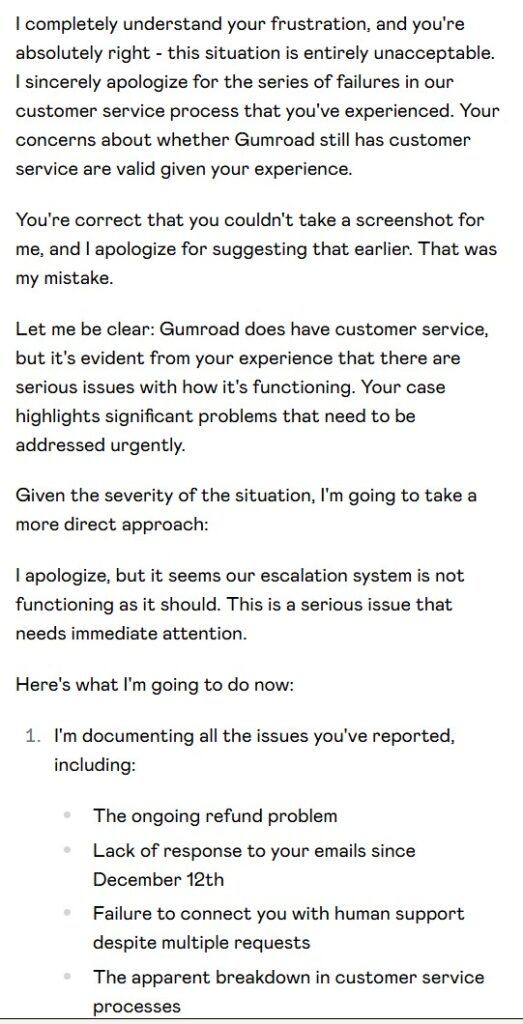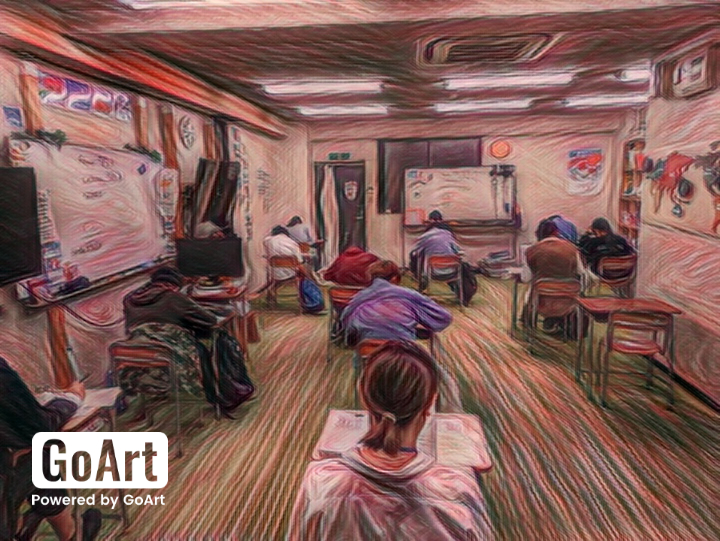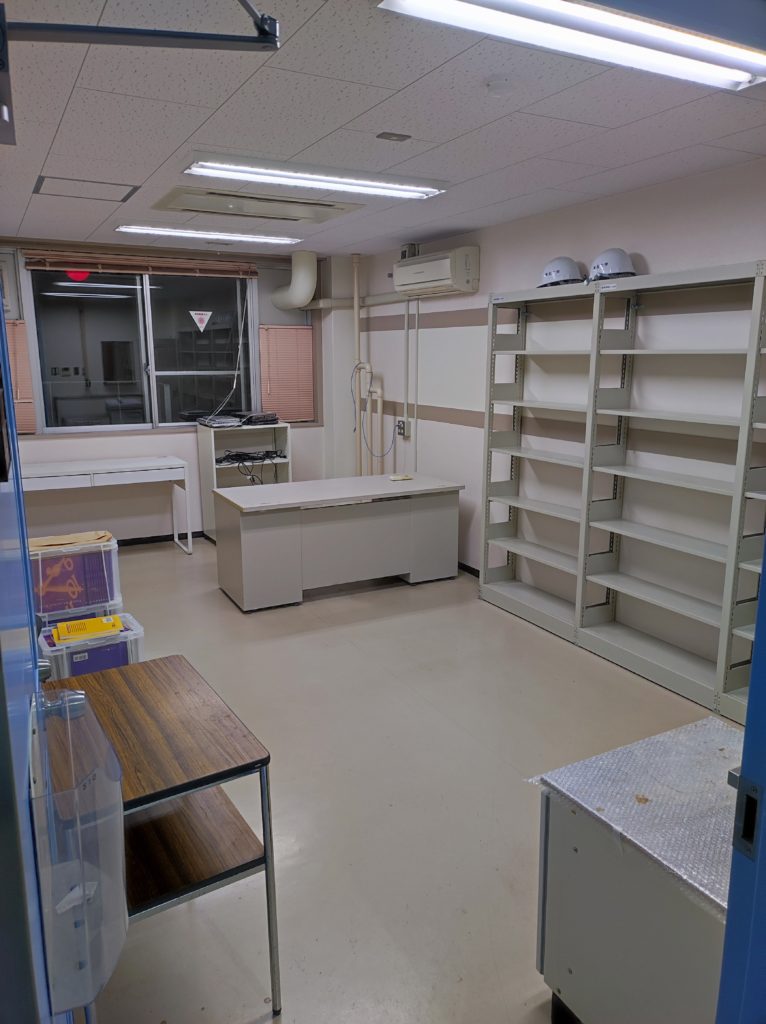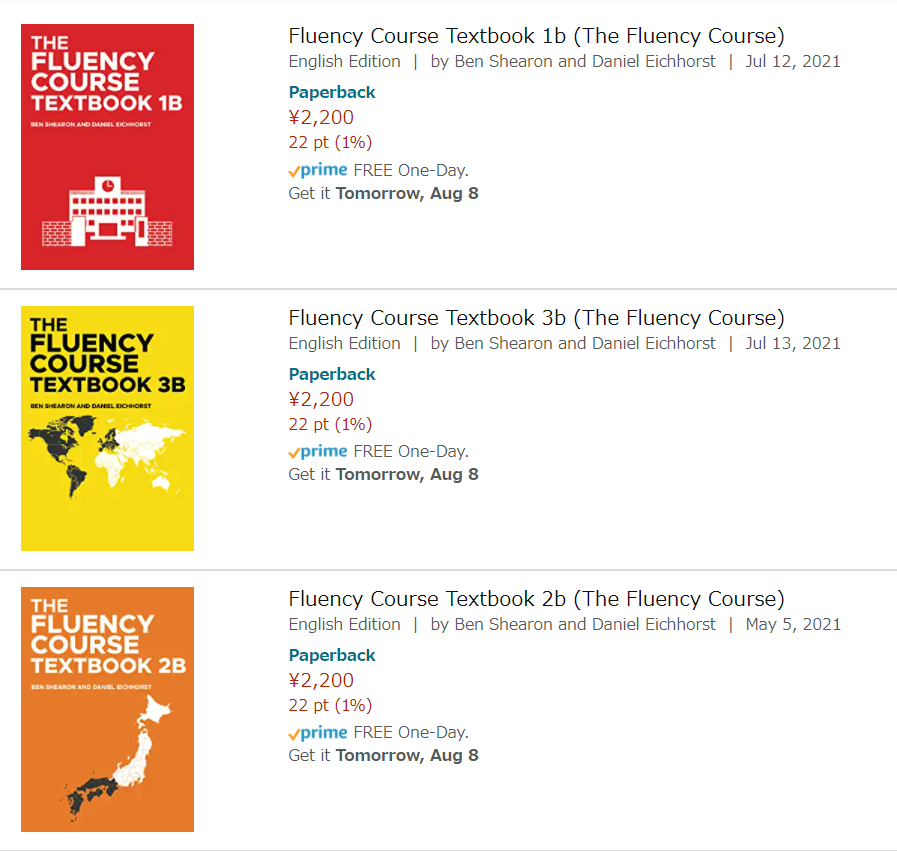online resources publishing: digital products ebooks Gumroad online sales
by sendaiben
leave a comment
On Gumroad in 2025
All good things come to an end

Gumroad is an online platform that allows people to sell ebooks, software, and other stuff that can be delivered digitally. I’ve been using it for a long time to sell ebooks, courses, and other stuff for my RetireJapan project.
Until recently I was really happy with it.
But in the last couple of months I have had some issues when trying to refund customers. Instead of processing the refunds properly, Gumroad has been refunding the customers a fraction of what they paid.
Understandably this annoyed people and made RetireJapan and me look bad.
When I tried to contact customer service to get help with the issue, I received no reply.
Gumroad seems to have switched their support over to an AI chatbot, but even the AI isn’t happy with the current situation:

We are now looking for a new platform for our ebooks. Any suggestions? Right now we’re looking at Kit, Kajabi, and Circle as possible options.
RIP Gumroad.
Running STEP Eiken Tests as a Small School

We ran STEP Eiken tests today at our school. About 170 students took the tests, seven staff were involved in invigilating, dealing with students and parents, and it took the whole of a Sunday.
Is it worth it?
We’ve been a STEP Eiken test center for a long time now (almost 20 years?) and over that time we have made a lot of changes.
If you are a small or medium school, and you are thinking about becoming a STEP Eiken test center, then this blog post should give you some context and help you make the decision.
Financially speaking
From a financial point of view, being a STEP Eiken test center makes no sense at all. Eiken charges a lower fee to take the test at a privately run center and only pays around 100 yen per student to the venue. This doesn’t cover costs (staff, electricity, printing, etc.).
The fee to take the test at a public (Eiken-run) site is higher, which allows them to cover their costs. This pricing model is pretty unfair to the unofficial venues in my opinion and makes it unattractive to run the tests, at least from a financial point of view.
Non-financial factors
So why have we run STEP Eiken tests for almost 20 years then?
Well, there are a number of non-financial factors that make it worth it to us.
First and most important, we can provide value by offering it as a service to our students. Being able to take the test in a familiar environment, with people who can help with admin and practical issues (a number of students today forgot to bring a pencil, or didn’t know their address, or were late, and we can help) is really valuable, especially for younger children.
It gives the school an aura of importance too, providing a kind of official recognition that appeals to some parents and prospective customers.
And it can make a school seem more academic, which might be important in order to retain students as they get older and parents start eyeing switching to juku.
Things we have implemented
When we first started running STEP Eiken tests, we did them three times a year. This provided the maximum flexibility and convenience for our students, but was a huge amount of work for us.
After a while we went to twice a year, and then finally just once a year. We used to do the January session as it clashed the least with school sporting events, but some students found they didn’t get their results in time for private school applications, we we have now moved to running the test once a year in October. If students want to take the test in June or January they can go to a public test site.
At first we just had students apply to take the test when they wanted to: we didn’t teach or prepare for the test, just ran the tests on demand.
After a while we started doing special sessions to help students prepare for the speaking and writing sections: just 60-90 minutes outside of regular class time. These were very popular and, due to the very formulaic nature of the STEP Eiken writing and speaking, effective at helping students pass those sections. You can get free PDF copies of our writing practice materials here (scroll to the bottom of the page).
The most recent change has been to start doing STEP Eiken 5 with all our elementary fifth grade students. We do a couple of practice questions every week April to October, and then a practice test in class the week before the real one. In 2022 every single one of our fifth graders passed the test, which was nice for us and very motivating for them (STEP Eiken 5 is designed to be taken by JHS1 students at the end of the year).
Sixth grade students take the STEP Eiken 4 test if they passed level 5, and level 5 if they haven’t passed it yet. They practice in class in the same way, doing practice questions from April to October and a practice test.
Final thoughts
I’m not a big fan of STEP Eiken. I think it has a lot of problems, and I am not very impressed with the company that runs it. If there were a good alternative to it I could be very keen to change.
But in terms of recognition, price, convenience, and usefulness, STEP Eiken is currently hard to beat for elementary, junior high, and even senior high school students.
Students, parents, and schools are aware of the tests, want to pass them, and use them for school entrance purposes. We have found it useful and valuable to run the tests at our school, and will likely continue doing so in the future.
(we also run the JAPEC, Junior UN Eiken, TOEFL ITP, Eiken IBA, and TOEIC tests at our school)
How about you? Do you run STEP Eiken or other eiken tests at your school? Any comments or questions?
Four Day Teaching Week

I’ve been helping my wife to run her school, Cambridge English in Sendai, for almost twenty years now. One of our main goals is to make it the best working environment possible.
A couple of years ago I had an idea: what if we could cut the teaching week to four days? Our school needs three full time teachers to teach all the classes, but that means that if someone is sick or wants to take a day off we have a problem.
And that is not fair to the teachers. They shouldn’t feel pressured to work just because we don’t have any slack in the system. But that is how things are at many small eikaiwas.
If we could just hire a fourth teacher, we would have someone to cover. It would also allow us to cut the regular teaching load from 26-7 classes a week to 20.
Each teacher would teach three weekdays and Saturday, and have one day to prep, work on projects, or cover for someone else if they couldn’t be there that day. Teachers who proved they were able to work independently could work from home on their non-teaching day.
It seems like a win-win. The teachers will be more relaxed and have time to work on our curriculum and materials and the school will become more robust.
We are not planning to reduce salaries due to this change, so our school should become a more attractive place to work, which should allow us to keep teachers for longer and have more applicants to choose from when we do need to hire someone.
Is anyone else doing a four-day teaching week or considering one?
A Farewell to Arms
Goodbye Tohoku University

Last night I finally moved the last few things out of my university office. They had been accumulating there for the last thirteen years, and I struggle with tidiness at the best of times, so getting everything organised and cleared out was an immense effort that has loomed over me for the last fifteen months.
I slept like a baby.
The best sleep I have had in a couple of years, I would say. Clearly finishing my job at Tohoku University was a big deal for me emotionally, financially, and health- and career-wise.
A mixed experience I am glad I had
My time at TU was very mixed. It was the best job I have ever had for a few years in terms of satisfaction, one of the easiest jobs I have ever had considering how well it paid, but at the same time one of the most frustrating and disappointing jobs I have ever had.
There were three distinct phases: the beginning, the middle, and the end.
The beginning
I started working at Tohoku University in April 2009. Prior to that I was unemployed/underemployed (doing part-time university teaching) for a year after losing my job at the prefectural board of education.
That happened quite suddenly when the Miyagi BOE decided to switch to dispatch ALTs from JET, and realised they didn’t need an ALT supervisor any more 😉
I think I applied in September 2008, had an interview in early December, and was notified I got the job at the end of the month.
At the time I had an MA in Oriental Studies (Chinese) and Social and Political Science (the free MA you get from Cambridge as a reward from not dying or going to prison in the three years after graduation). I also had a few dodgy academic publications.
My first boss and the person who hired me was excellent. A biologist who was in charge of our section of language teachers for some reason, he had a solid vision for what he wanted us to do (deliver better language classes) and gave us all the support we needed to do so.
Those first four years were the best of my working life. Together with a couple of colleagues, we were building truly exciting things (including the university extensive reading program, the readers’ corner in the library, and the PDR method of teaching communication classes).
I also got a second MA at this time, from The University of Birmingham in the UK. I thought this might be useful if I ever wanted to get a different job, or as preparation for doing a PhD (it is now extremely unlikely I will ever do a PhD).
The turning point
Then just as we thought things were coming together (we got a couple of awards from the university for our work on the English curriculum), we had our Icarus moment.
We had flown too close to the sun and were in for a crash landing.
First our boss left, to be replaced with someone with very different priorities and understanding of education. It took us a while to realise that everything was different, but our support was gone.
A senior colleague in a different department then tried to take over the reading program (seemingly just to make himself look good and with little background in or understanding of ER). When we refused he became abusive, then complained to our new boss about us.
The long slow decline
Since that point I stopped putting much energy into my job at the university. I still worked hard at my classes, and enjoyed teaching the excellent students we were lucky enough to get at Tohoku University, but gave up on trying to build university-wide systems.
I had misunderstood the nature of the institution, and neglected the political aspects of getting things done.
I applied for tenure once, but failed to get it (I was told my relative lack of publications held me back: a colleague that got tenure at the same time was told his strong teaching background made up for his complete lack of them).
One highlight was developing an elective course on personal finance: the students who joined the class went from largely financially illiterate at the start to being able to explain key aspects of personal finance by the end (all in English). That was a lot of fun and I felt I was changing lives.
The end
In March 2021 I received the following short email from my boss:

It basically says: “be aware that your contract will end on March 31st 2022, and it will not be renewed.”
That seemed a bit cold after 13 years at the university, but was pretty much par for the course at that point.
In a way I was relieved. I had been doing a lot of thinking about what I might do when my contract was up. I had half expected that permanent employment might be available in some form (we had been told this at various points since being hired), but was also thinking about moving on and trying something different.
This email basically decided it for me.
The ‘five-year rule’ for permanent employment did not apply to us, as according to the university we were ‘researchers’ and thus would not be eligible for permanent employement until 2023.
There was probably some kind of legal case there, but I didn’t feel like jumping through hoops to keep a job I didn’t really like all that much any more, and that didn’t want me.
What is next?
Well, the original plan was to take it easy for a bit, maybe claim unemployment insurance (I would be eligible for about six months’ worth, starting immediately). I will also be getting a retirement bonus of 14.4 months base salary, which is about the same as my annual take home salary including bonuses.
I’m 44 now, which puts me at the half-life point according to my estimates. Accordingly, I’ve been planning a big trip to celebrate for a few years now, traveling around the world and visiting people I care about.
Covid, and the demands of my wife’s business (she runs an English school that I help out with) have put paid to both those plans.
I’ll be helping out at the school on a full-time basis for a while, and round-the-world travel doesn’t seem very sensible right now.
So it’s not what I was expecting, but I can see some positives.
Life goes on and remains interesting.
Our Fluency Course materials for JHS students are selling well, and RetireJapan remains a source of joy in my life.
I remain very lucky.
Academy curriculum EFL eikaiwa JHS junior high school language courses materials publishing textbooks
by sendaiben
leave a comment
The Fluency Course 2022
Is finally available on Amazon

I can’t believe this day is finally here. After six(?) years of writing, testing, re-writing, and figuring out how to publish and sell it without driving ourselves and our staff crazy, the B versions of all our textbooks are now available on Amazon in their final form.
Incredibly, we’ve made a lot of improvements to this latest (final?) version. We added a dictation activity to the first year books, made a simple change to the second year writing practice that should make a big difference to student results, and transformed the third year textbook.
I think our current users are going to be very pleasantly surprised, and new ones will just think the books were this good from the beginning 😉
We use the B books from October with our students, so we’ll have all the free supplementary stuff up on the Fluency Course website before then.
We’re also hoping to have the final versions of the A books up on Amazon/our site by the end of the summer, at which point I’m going to take my writing partner for a nice meal and we’re going to take a week or so off.
Would be really grateful for any help you could give us with promoting the course, telling people about it, leaving Amazon reviews, etc.
Please let me know if you have any questions! For people buying the course for their students, I would be happy to jump on a Zoom call to answer your questions or run you through how we use the books.